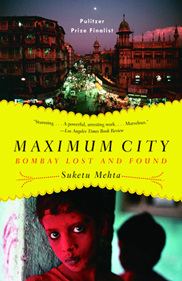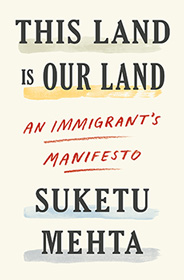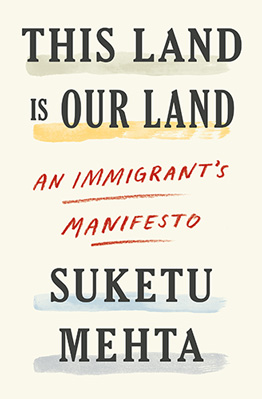Suketu Mehta is the New York-based author of Maximum City: Bombay Lost and Found, which won the Kiriyama Prize and the Hutch Crossword Award, and was a finalist for the 2005 Pulitzer Prize, the Lettre Ulysses Prize, the BBC4 Samuel Johnson Prize, and the Guardian First Book Award. He has won the Whiting Writers’ Award, the O. Henry Prize, and a New York Foundation for the Arts Fellowship for his fiction. Mehta’s work has been published in The New Yorker, The New York Times Magazine, National Geographic, Granta, Harper’s Magazine, Time, and Newsweek, and has been featured on NPR’s ‘Fresh Air’ and ‘All Things Considered.’ His book, This Land Is Our Land: An Immigrant's Manifesto (Farrar, Straus, Giroux), was selected by Publisher's Weekly as one of the top 10 books being published in 2019.
About THIS LAND IS OUR LAND: An Immigrant's Manifesto
There are few subjects in American life that prompt more discussion and controversy than immigration. But do we really understand it? In This Land Is Our Land: An Immigrants Manifesto, the renowned author Suketu Mehta attacks the issue head-on. Drawing on his own experience as an Indian-born teenager growing up in New York City and on years of reporting around the world, Mehta subjects the worldwide anti-immigrant backlash to withering scrutiny. As he explains, the West is being destroyed not by immigrants but by the fear of immigrants.
Mehta juxtaposes the phony narratives of populist ideologues with the ordinary heroism of laborers, nannies, and others, from Dubai to Queens, and explains why more people are on the move today than ever before. As civil strife and climate change reshape large parts of the planet, it is little surprise that borders have become so porous. But Mehta also stresses the destructive legacies of colonialism and global inequality on large swaths of the world: When today’s immigrants are asked, “Why are you here?” they can justly respond, “We are here because you were there.” And now that they are here, as Mehta demonstrates, immigrants bring great benefits, enabling countries and communities to flourish. Impassioned, rigorous, and richly stocked with memorable stories and characters, This Land Is Our Land is a timely and necessary intervention, and a literary polemic of the highest order.
Mehta is an Associate Professor of Journalism at New York University. He is currently working on a nonfiction book about immigrants in contemporary New York, for which he was awarded a 2007 Guggenheim fellowship. He has also written original screenplays for films, including ‘New York, I Love You’, and a novella “What is Remembered” [2016]. Mehta was born in Calcutta and raised in Bombay and New York. He is a graduate of New York University and the Iowa Writers’ Workshop.

A native of Bombay, Suketu Mehta gives us an insider’s view of this stunning metropolis. He approaches the city from unexpected angles, taking us into the criminal underworld of rival Muslim and Hindu gangs, following the life of a bar dancer raised amid poverty and abuse, opening the door into the inner sanctums of Bollywood, and delving into the stories of the countless villagers who come in search of a better life and end up living on the sidewalks.
As each individual story unfolds, Mehta also recounts his own efforts to make a home in Bombay after more than twenty years abroad. Candid, impassioned, funny, and heartrending, Maximum City is a revelation of an ancient and ever-changing world.

This Land Is Our Land: An Immigrant's Manifesto
By Suketu Mehta
A timely argument for why the United States and the West would benefit from accepting more immigrants.
There are few subjects in American life that prompt more discussion and controversy than immigration. But do we really understand it? In This Land Is Our Land, the renowned author Suketu Mehta attacks the issue head-on. Drawing on his own experience as an Indian-born teenager growing up in New York City and on years of reporting around the world, Mehta subjects the worldwide anti-immigrant backlash to withering scrutiny. As he explains, the West is being destroyed not by immigrants but by the fear of immigrants. Mehta juxtaposes the phony narratives of populist ideologues with the ordinary heroism of laborers, nannies, and others, from Dubai to Queens, and explains why more people are on the move today than ever before. As civil strife and climate change reshape large parts of the planet, it is little surprise that borders have become so porous. But Mehta also stresses the destructive legacies of colonialism and global inequality on large swaths of the world: When today’s immigrants are asked, “Why are you here?” they can justly respond, “We are here because you were there.” And now that they are here, as Mehta demonstrates, immigrants bring great benefits, enabling countries and communities to flourish. Impassioned, rigorous, and richly stocked with memorable stories and characters, This Land Is Our Land is a timely and necessary intervention, and a literary polemic of the highest order.
The city has become an obsession for Suketu Mehta, internationally acclaimed for his book Maximum City: Bombay Lost and Found
PRAISE FOR: THIS LAND IS OUR LAND: An Immigrant's Manifesto
“In an age of brutal anti-immigrant rhetoric and policy, ‘This Land is Our Land’ offers a meticulously researched and deeply felt corrective to the public narrative of who today’s migrants are, why they are coming, and what economic and historical forces have propelled them from their homes into faraway lands. We are, and always have been, a planet on the move, Mehta observes…’This Land Is Our Land’ reads like an impassioned survey course on migration, laying bare the origins of mass migration in searing clarity.”
—The New York Times
“A withering rebuke to the anti-immigration rhetoric that has arisen in global politics in recent years… Mehta dismantles the narratives of populist ideologues in a fierce defense of global immigration.”
—“32 Books You Need to Read This Summer,” Time.com
“An urgent and impassioned call for why countries should accept more migrants… As the country heads into the 2020 presidential election, Mehta’s moving, cogent book can help us find a way forward.”
—Datebook, The San Francisco Chronicle
"Written 'in sorrow and anger,' this is a brilliant and urgently necessary book, eloquently making the case against bigotry and for all of us migrants—what we are not, who we are, and why we deserve to be welcomed, not feared."
—Salman Rushdie
"The must-read book for 2019. Suketu Mehta is one of our finest thinkers and writers on the subject of immigration. What begins as a journey that mixes just the right amount of humor, anger and bewilderment at the state of our nation, ends up with a surprising double-shot of hope. This is the rare book that is pragmatic and unsentimental, and yet oddly uplifting."
—Gary Shteyngart, author of Super Sad True Love Story and Lake Success
"Mehta has written a compassionate and powerful plea on behalf of migrants that also reveals the deep forces that propel them on their journeys. He exposes the demeaning ways that migrants are treated around the world, and the very human aspirations that may lead them to acccept this dehumanization. In so doing, he gives us a searing indictment of those like Donald Trump who do so much to make their plight even worse."
—Joseph Stiglitz, Nobel Laureate in Economics
"A powerful, passionate, angry, and hopeful cry for sanity and justice by one of our finest writers. Mehta's heart-felt book is a much-needed and potent antidote to the anti-migrant rhetoric that has grown so threateningly loud of late. Let them come!"
—Mohsin Hamid, author of Exit, West and The Reluctant Fundamentalist, among others.
"Suketu Mehta has written a burning indictment of anti-immigrant hypocrisy, and an affirmation of hope in the real America—the America where we treat each other as human beings with a common future, and not a faceless problem to be solved by walls and barbed wire. Rousing and immensely readable, it is an anthem for all of us."
—Jhumpa Lahiri, author of The Lowland
"A fearless and brutally honest look at the rise and inevitable fall of national borders and those who seek to enforce them. This Land is Our Land lays bare the structural inequalities forcing millions of migrants to flee their countries of origin, and persuasively contends that powerful nations have an obligation to welcome those they have uprooted."
—Becca Heller, Refugee Rights Lawyer and MacArthur Fellow
“This is a fiercely and well told story by a patriotic American about the value and challenges of our most inspiring heroes: Our immigrants.”
—Bob Kerrey, former US Senator and Governor of Nebraska
"This heavily researched and passionately argued work deconstructs American misbeliefs about immigration. The U.S. is better—not worse—because of immigration, says Mehta, whose Maximum City (2004) was a Pulitzer finalist. Modern immigration’s origins, correctly identified, are the earlier migrations of colonialist countries into sovereign nations and the forcible, often violent, removal of resources. Immigrants are only following their own wealth, necessary because its plundering often created destabilization. One of the world’s poorest countries, Haiti, was made so by France’s demand for payments of $40 billion in adjusted dollars merely to recognize the former colony’s sovereignty. Haiti paid for more than one hundred years, from 1825 to 1947; reparations requests have been ignored. This is just one of the many real-world immigration stories, past and present, included here. The author identifies the real problem as the fear of immigration, stoked by false narratives, and he encourages America to embrace what immigrants have to offer. An immigrant himself, Mehta weights his personal, readable manifesto with history and data. The result is a profound combination of disturbing, convincing, clear-eyed, and hopeful.
— Emily Dziuban, Booklist
PRAISE FOR:
MAXIMUM CITY: Bombay Lost and Found
Bombay native Mehta fills his kaleidoscopic portrait of “the biggest, fastest, richest city in India” with captivating moments of danger and dismay. Returning to Bombay (now known as Mumbai) from New York after a 21-year absence, Mehta is depressed by his beloved city’s transformation, now swelled to 18 million and choked by pollution. Investigating the city’s bloody 1992-1993 riots, he meets Hindus who massacred Muslims, and their leader, the notorious Godfather-like founder of the Hindu nationalist Shiv Sena party, Bal Thackeray, “the one man most directly responsible for ruining the city I grew up in.” Daring to explore further the violent world of warring Hindu and Muslim gangs, Mehta travels into the city’s labyrinthine criminal underworld with tough top cop Ajay Lal, developing an uneasy familiarity with hit men who display no remorse for their crimes. Mehta likewise deploys a gritty documentary style when he investigates Bombay’s sex industry, profiling an alluring, doomed dancing girl and a cross-dressing male dancer who leads a strange double life. Mehta includes so-called “Bollywood” in his sweeping account of Bombay’s subcultures: he hilariously recounts, in diary style, day-to-day life on the set among the aging male stars of the action movie Mission Kashmir. Mehta, winner of a Whiting Award and an O. Henry Prize, is a gifted stylist. His sophisticated voice conveys postmodern Bombay with a carefully calibrated balance of wit and outrage, harking back to such great Victorian urban chroniclers as Dickens and Mayhew while introducing the reader to much that is truly new and strange.
—PUBLISHERS WEEKLY (STARRED REVIEW)
“Stunning. . . . A powerful, arresting work. . . . Marvelous.” –Los Angeles Times Book Review“Narrative reporting at its finest, probably the best work of nonfiction to come out of India in recent years. . . . Mehta succeeds so brilliantly in taking the pulse of this riotous urban jungle.”
—THE NEW YORK TIMES BOOK REVIEW
As each individual story unfolds, Mehta also recounts his own efforts to make a home in Bombay after more than twenty years abroad. Candid, impassioned, funny, and heartrending, Maximum City is a revelation of an ancient and ever-changing world. “What Dickens did for London, what Joseph Mitchell did for New York City, Suketu Mehta has done for Bombay. . . . A candid, extensive, and wholly entertaining portrait.”
—SAN DIEGO UNION-TRIBUNE
The ultimate insider’s view of Bombay, a roiling and vigorous account that delivers on a seemingly impossible challenge: how to limn the diversity and sprawl of such a place in a single book.”
—THE SEATTLE TIMES
Television:
CNN: On Amanpour & Co. 05.21.2019
https://www.pbs.org/wnet/amanp...
Reviews, Excerpts & Articles:
New York Times 06.04.2019
https://www.nytimes.com/2019/0...
TIME 05.23.2019
http://time.com/5594365/americ...
Foreign Policy
This Land is Their Land
Article on migrants and immigration in America in Foreign Policy, September/October 2017 issue.
Go East, Young American
Opinion piece on emigration from America in the New York Times’ Sunday Review, April 21, 2017.
Why Japan is big on the little things
Feature on the detail-oriented beauty of Japan’s culture in Conde Nast Traveller India, March 3, 2017
Queens of the Stoned Age
Feature story about NYC’s most fabulous weed delivery ring in GQ, February 14, 2017
Can a Bombay Strongman Explain Trump?
Op-Ed about understanding Donald Trump through understanding Bal Keshav Thackeray, “who rode to power on a wave of outrageous stories, bluster, lies, bigotry and showmanship” in the New York Times, January 6, 2017
Beyond the maximum: cities may be booming, but who’s invited to the party?
Article on who’s included and who’s excluded in the building of a great city for The Guardian, November 30, 2015\
City of our blighted future
Article on contemporary Mumbai for India Today, October 28, 2015
The wild and explosive TnT
Travel article on Trinidad and Tobago, Condé Nast Traveller International(originally appeared in October-November issue of Condé Nast Traveller India), August 3, 2015
Papad: At the short end of Bombay’s boom-to-bust cycle
Essay in The Common, May 7, 2015
Nina
Essay in Harper’s Magazine, December 2014 issue
Kannada writer Ananthamurthy loved whiskey and a good argument
Tribute to U. R. Ananthamurthy, Scroll.in, Aug 23, 2014
Pearls of Regret: ‘Bombay Stories’ by Saadat Hasan Manto
Book Review in the Sunday Book Review, The New York Times, May 8, 2014
What Are Parents Being Pushy About?
Op-Ed on parents, teaching and schooling in America for The New York Times, February 10, 2014
The ‘Tiger Mom’ Superiority Complex
Essay on the “new racism” for Time Magazine, February 3, 2014
In the Violent Favelas of Brazil
Essay on the reformation of Brazilian favelas for The New York Review of Books, August 15, 2013
Life in the Cellar
Article on illegal basements in New York City for The Nation, April 18, 2013
India’s Speech Impediments
Op-Ed piece on freedom of speech in India for The New York Times, February 5, 2013
India’s War on Its Women
Op-Ed piece on rape crisis in New Delhi for Time Magazine, January 14, 2013
Why Money Can’t Buy an Election
Essay on U.S. presidential election for India Today, November 9, 2012
Sea and be seen
Article on Trinidad and Tobago for Condé Nast Traveller, October/November, 2012
Yoga, American Style
Article on yoga for The New York Times, January 12, 2012
The Outsider
Exclusive interview with Raj Rajaratnam for Newsweek, October 23, 2011
The Asylum Seeker
Article about asylum-seekers embellishing their stories in The New Yorker, August, 2011
The City: New York
Essay on immigration in New York for Newsweek, May 15, 2011
A Cloud Still Hangs Over Bhopal
Op-Ed piece on the 25th anniversary of the Bhopal gas disaster for The New York Times, December 2, 2009
What They Hate About Mumbai
Op-Ed piece on Mumbai terror attacks for The New York Times, November 28, 2008
The terrorists attacked my city because of its wealth
Essay on Mumbai terror attacks for The Guardian, November 27, 2008
The New Faces of America
Article on immigrant networks for Forbes, May 7, 2007
A Big Stretch
Op-Ed piece on yoga for The New York Times, May 7, 2007
Sonia Gandhi
Profile for the Time 100, May 3, 2007
Lush Life
Article on the Caribbean for Condé Nast Traveler, July 2006
So the Jains, They Have a Problem with Beef in the School Lunches? Who They Gonna Call?
Article about immigrant power broker Alex Martins for The New York Times, October 2, 2005
The Great Awakening
Article about Brooklyn for The New York Times, June 19, 2005\
Welcome to Bollywood
Article about Bollywood for National Geographic, February 2005
‘Now We Hate Seeing This Sea’
Commentary on the tsunami disaster for The Wall Street Journal, December 28, 2004
Future on display in ‘Maximum City’
Op-Ed on India for The Baltimore Sun, November 28, 2004
Bollywood Confidential
Essay on Bollywood for The New York Times Magazine, November 14, 2004
Peace in Paradise
Essay on Sri Lanka for Condé Nast Traveler, July 2004
A Fatal Love
A talk on Partition for the Center for the Study of Developing Societies, January 2004\
The Meltingest Pot
Article about the Calloway Château in Queens for The New York Times Magazine, October 05, 2003
Runaway:a chronicle of metropolitan transience
Essay on a Bombay runaway for Seminar, August, 2003
Stuck in the Middle in a Very High Place
Review of Samrat Upadhyay’s The Guru of Love for The New York Times Book Review, January 12, 2003
Big Apple tastes better in the dark
Essay on the Great New York Blackout of 2003 for Indian Express, August 16, 2003\
Gangsters in Exile
Article on Bombay gangsters for Time Magazine, April 29, 2002


